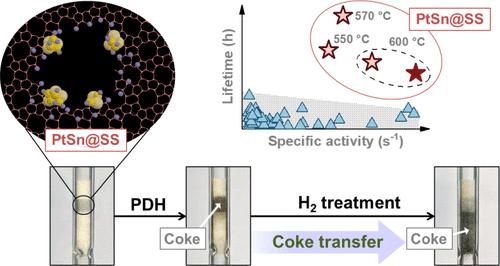Ultradurable Regenerative Propane Dehydrogenation Catalyst by Fluorination-Induced Confining and Positioning
IF 15.6
1区 化学
Q1 CHEMISTRY, MULTIDISCIPLINARY
引用次数: 0
Abstract
In the chemical industry, an elaborated design of catalysts for propane dehydrogenation (PDH) should be capable of high propane conversion and propylene selectivity, strong resistance to sintering and coke deposition, and easy regeneration. Here, we report a unique design of fluorinated siliceous MFI zeolite-clothed PtSn for PDH, where the fluorination induces the formation of “holes” in all-silica molecular sieves and the position of ultrasmall PtSn nanoclusters as a result of high activity, selectivity, and especially remarkable resistance to sintering during PDH over 5000 h. The present catalyst displays a near-thermodynamic-limited propane conversion and 94% propylene selectivity in pure propane, respectively, under industrially relevant conditions. Impressively, the coked catalyst can be simply regenerated by H2 treatment at the same temperature for PDH, avoiding the complicated, poisonous, and corrosive oxychlorination process in the conventional method for regeneration, which will contribute to the extensive application of the industrial PDH process. Detailed investigations demonstrate that the strong synergy between F-modified PtSn nanoclusters and MFI zeolite can promote the selective PDH to propylene and stabilize PtSn nanoclusters against sintering and coke deposition. The unique design of the catalyst and the enhanced performance will provide a feasible strategy to solve the current difficulties in the industrial PDH process.

超耐用再生丙烷脱氢催化剂的氟化约束与定位
在化学工业中,丙烷脱氢催化剂的精心设计应具有丙烷转化率高、丙烯选择性强、耐烧结、耐积炭、易于再生等特点。在这里,我们报道了一种独特的设计,氟化硅质MFI沸石包裹的PtSn用于PDH,其中氟化诱导在全硅分子筛中形成“孔”和超小型PtSn纳米簇的位置,这是由于其高活性,选择性,特别是在PDH超过5000小时的烧结过程中具有显著的耐烧结性。目前的催化剂分别显示出接近热力学限制的丙烷转化率和94%的丙烯选择性纯丙烷。在工业相关条件下。令人印象深刻的是,焦化催化剂可以在相同温度下通过H2处理简单地再生PDH,避免了传统再生方法中复杂、有毒、腐蚀性强的氧化氯化过程,这将有助于工业PDH工艺的广泛应用。详细的研究表明,f修饰的PtSn纳米团簇与MFI沸石之间的强协同作用可以促进PDH对丙烯的选择性,并稳定PtSn纳米团簇,防止烧结和积炭。该催化剂的独特设计和性能的提高将为解决目前工业PDH工艺中的难题提供一个可行的策略。
本文章由计算机程序翻译,如有差异,请以英文原文为准。
求助全文
约1分钟内获得全文
求助全文
来源期刊
CiteScore
24.40
自引率
6.00%
发文量
2398
审稿时长
1.6 months
期刊介绍:
The flagship journal of the American Chemical Society, known as the Journal of the American Chemical Society (JACS), has been a prestigious publication since its establishment in 1879. It holds a preeminent position in the field of chemistry and related interdisciplinary sciences. JACS is committed to disseminating cutting-edge research papers, covering a wide range of topics, and encompasses approximately 19,000 pages of Articles, Communications, and Perspectives annually. With a weekly publication frequency, JACS plays a vital role in advancing the field of chemistry by providing essential research.

 求助内容:
求助内容: 应助结果提醒方式:
应助结果提醒方式:


